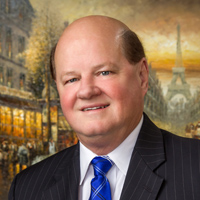7 Things You Need to Know About Mutual Funds
Do you know what dead money costs are? Have you read your prospectus? What you don’t know can cost you.


Profit and prosper with the best of Kiplinger's advice on investing, taxes, retirement, personal finance and much more. Delivered daily. Enter your email in the box and click Sign Me Up.
You are now subscribed
Your newsletter sign-up was successful
Want to add more newsletters?

Delivered daily
Kiplinger Today
Profit and prosper with the best of Kiplinger's advice on investing, taxes, retirement, personal finance and much more delivered daily. Smart money moves start here.

Sent five days a week
Kiplinger A Step Ahead
Get practical help to make better financial decisions in your everyday life, from spending to savings on top deals.

Delivered daily
Kiplinger Closing Bell
Get today's biggest financial and investing headlines delivered to your inbox every day the U.S. stock market is open.

Sent twice a week
Kiplinger Adviser Intel
Financial pros across the country share best practices and fresh tactics to preserve and grow your wealth.

Delivered weekly
Kiplinger Tax Tips
Trim your federal and state tax bills with practical tax-planning and tax-cutting strategies.

Sent twice a week
Kiplinger Retirement Tips
Your twice-a-week guide to planning and enjoying a financially secure and richly rewarding retirement

Sent bimonthly.
Kiplinger Adviser Angle
Insights for advisers, wealth managers and other financial professionals.

Sent twice a week
Kiplinger Investing Weekly
Your twice-a-week roundup of promising stocks, funds, companies and industries you should consider, ones you should avoid, and why.

Sent weekly for six weeks
Kiplinger Invest for Retirement
Your step-by-step six-part series on how to invest for retirement, from devising a successful strategy to exactly which investments to choose.
Whether you’re an experienced investor or just a beginner, you probably know something about mutual funds.
They’ve been around since 1924, and the Investment Company Institute estimates that nearly half of all U.S. households now invest in them.
Mutual funds have grown so popular because they offer easy access to different securities without the need to research and buy hundreds of stocks. Years ago, before mutual funds, small investors couldn’t put up enough money to invest in a company like Apple or Microsoft. Now, they can get into a fund that holds those sought-after stocks (or commodities, bonds, currencies and precious metals).
From just $107.88 $24.99 for Kiplinger Personal Finance
Become a smarter, better informed investor. Subscribe from just $107.88 $24.99, plus get up to 4 Special Issues

Sign up for Kiplinger’s Free Newsletters
Profit and prosper with the best of expert advice on investing, taxes, retirement, personal finance and more - straight to your e-mail.
Profit and prosper with the best of expert advice - straight to your e-mail.
Hidden costs of mutual funds
But there are many things about mutual funds the average investor might not be aware of — and those gaps in your knowledge could end up costing you money.
Often your fund’s expenses can be higher than you think. There are the stated expenses (disclosure is required by the Securities Exchange Act of 1934), which include administrative, management and marketing fees, as well as front- or back-end commissions. But there are plenty of unstated expenses as well, but you have to know where to look in order to find them.
Each time a mutual fund buys and sells, it incurs a small trading cost. The greater the activity, the higher the cost. There are transaction commissions and market impact costs, too. And mutual funds can be tax inefficient. Often, a fund will issue 1099s for gains the fund made. The investor doesn’t actually see the money — it’s reinvested — but they pay taxes on it.
Tips for investors
What can you do to help make better investment decisions for your hard-earned money?
- 1. Check out the portfolio’s turnover. It’s the measure of how often a fund buys and sells assets, and it can give you an idea of the strategy the fund manager is following.
- 2. Look at the tenure of the fund manager. If there’s a new manager every three to five years, that may a red flag. You want someone with a track record leading your fund.
- 3. Watch for misleading advertising. Don’t fall for a fund just because it has a sexy name that sounds like a money-maker.
- 4. Be clear about the risks tied to a bond mutual fund. A fund might have some insured or guaranteed bonds, but it also may have some high-risk bonds. Make sure you’re comfortable with the level of risk.
- 5. Be aware of dead money costs. A fund manager has to hold onto a certain amount of cash for redemptions and purchase opportunities. You own a percentage of that cash. You may think your money is 100% invested, but it rarely is.
- 6. Read the prospectus. A mutual fund has to disclose its activities in the prospectus, but not everyone looks at it, or they give it a cursory glance. That’s where you’ll find the information you need to make a sound judgment before you buy. For help in understanding the language, check out the U.S. Securities and Exchange Commission’s “How to Read a Mutual Fund Prospectus.”
- 7. Don’t get too caught up in the Morningstar ratings. Morningstar ratings serve a purpose: They can give you a sense of a fund’s risk-adjusted return and how well it has performed relative to others in its category. But the system has limitations and should not be your sole decision-making metric.
You don’t need to become an expert on mutual funds, but you do need to know the basics. Talk to a trusted financial professional who can help you understand the good, the bad and the fine print.
Kim Franke-Folstad contributed to this article.
Investment advisory services offered through Global Financial Private Capital, LLC, an SEC Registered Investment Adviser. SEC registration does not imply any level of skill or training.
Profit and prosper with the best of Kiplinger's advice on investing, taxes, retirement, personal finance and much more. Delivered daily. Enter your email in the box and click Sign Me Up.

Paul E. Roberts Jr. is the founder and chief investment officer of Roberts Wealth Management. He has passed the Series 65 exam and has insurance licenses in Texas, Louisiana, Mississippi and Alabama. He spent 22 years as a practicing CPA, then founded Roberts Wealth Management, a firm that focuses on estate preservation and retirement planning. His primary areas of focus are retirement income planning, investment management, 401(k)/individual retirement account (IRA) guidance and asset protection.
-
 5 Investing Rules You Can Steal From Millennials
5 Investing Rules You Can Steal From MillennialsMillennials are reshaping the investing landscape. See how the tech-savvy generation is approaching capital markets – and the strategies you can take from them.
-
 The Tool You Need to Avoid a Post-Divorce Administrative Nightmare
The Tool You Need to Avoid a Post-Divorce Administrative NightmareLearn why a divorce decree isn’t enough to protect your retirement assets. You need a QDRO to divide the accounts to avoid paying penalties or income tax.
-
 When Estate Plans Don't Include Tax Plans, All Bets Are Off
When Estate Plans Don't Include Tax Plans, All Bets Are OffEstate plans aren't as effective as they can be if tax plans are considered separately. Here's what you stand to gain when the two strategies are aligned.
-
 When Estate Plans Don't Include Tax Plans, All Bets Are Off: 2 Financial Advisers Explain Why
When Estate Plans Don't Include Tax Plans, All Bets Are Off: 2 Financial Advisers Explain WhyEstate plans aren't as effective as they can be if tax plans are considered separately. Here's what you stand to gain when the two strategies are aligned.
-
 Counting on Real Estate to Fund Your Retirement? Avoid These 3 Costly Mistakes
Counting on Real Estate to Fund Your Retirement? Avoid These 3 Costly MistakesThe keys to successful real estate planning for retirees: Stop thinking of property income as a reliable paycheck, start planning for tax consequences and structure your assets early to maintain flexibility.
-
 I'm a Financial Planner: These Small Money Habits Stick (and Now Is the Perfect Time to Adopt Them)
I'm a Financial Planner: These Small Money Habits Stick (and Now Is the Perfect Time to Adopt Them)February gets a bad rap for being the month when resolutions fade — in fact, it's the perfect time to reset and focus on small changes that actually pay off.
-
 Social Security Break-Even Math Is Helpful, But Don't Let It Dictate When You'll File
Social Security Break-Even Math Is Helpful, But Don't Let It Dictate When You'll FileYour Social Security break-even age tells you how long you'd need to live for delaying to pay off, but shouldn't be the sole basis for deciding when to claim.
-
 I'm an Opportunity Zone Pro: This Is How to Deliver Roth-Like Tax-Free Growth (Without Contribution Limits)
I'm an Opportunity Zone Pro: This Is How to Deliver Roth-Like Tax-Free Growth (Without Contribution Limits)Investors who combine Roth IRAs, the gold standard of tax-free savings, with qualified opportunity funds could enjoy decades of tax-free growth.
-
 One of the Most Powerful Wealth-Building Moves a Woman Can Make: A Midcareer Pivot
One of the Most Powerful Wealth-Building Moves a Woman Can Make: A Midcareer PivotIf it feels like you can't sustain what you're doing for the next 20 years, it's time for an honest look at what's draining you and what energizes you.
-
 I'm a Wealth Adviser Obsessed With Mahjong: Here Are 8 Ways It Can Teach Us How to Manage Our Money
I'm a Wealth Adviser Obsessed With Mahjong: Here Are 8 Ways It Can Teach Us How to Manage Our MoneyThis increasingly popular Chinese game can teach us not only how to help manage our money but also how important it is to connect with other people.
-
 Looking for a Financial Book That Won't Put Your Young Adult to Sleep? This One Makes 'Cents'
Looking for a Financial Book That Won't Put Your Young Adult to Sleep? This One Makes 'Cents'"Wealth Your Way" by Cosmo DeStefano offers a highly accessible guide for young adults and their parents on building wealth through simple, consistent habits.